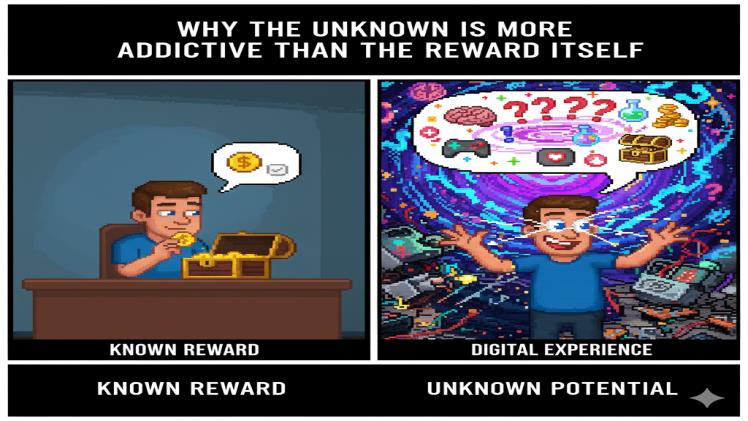The anticipation in your fingertips before cracking another mystery box, pressing a button after you have completed a level in a video game, or watching the reels fall on sites such as Dragon Slots Official is often more addictive than the reward that actually follows. It’s inquisitive–and most surprising of all, universal–side of human conduct: we’re wired to go after it.
The Thrill of Not Knowing
Uncertainty attracts humans at a tender age. Consider it: it is not the gift that makes opening a present exciting, but the guessing game they play before the moment of opening. Many digital habits today are anchored on the same principle. Our brains are now programmed to believe that suspense can hardly be resisted, whether it is checking notifications in an online game, trying a new option in the chosen application, or a surprise bonus our minds have just found out about.
The appeal of uncertainty directly touches our feelings. Predictable rewards are safe and monotonous. Variable rewards, which are the type you are presented with when you do not know what you are getting next, are exciting and generate curiosity, a dopamine loop and a touch of irrational decision-making. Social networks such as Dragon Slots Official are subtly playing to this dynamic: every spin or interaction is a new unknown. This mini-adventure keeps users engaged, though they may not necessarily understand why.
Variable Rewards and Fixed Rewards.
Uncertainty can be a stronger motivating factor than certainty, and behavioural science has always recognised that. Psychologist B.F. Skinner demonstrated this with variable schedules of reinforcement, in which animals, as well as humans, work harder when rewards are administered inconsistently rather than on a regular schedule.
Practically, we may be obsessively checking an application or reloading a game display. The cycle of Dopamine hijacks our brains: anticipation leads to excitement, engagement leads to excitement, and engagement can be maintained even with a small reward—or no reward at all.
This does not apply only to gambling. The games’ loot boxes, surprise notifications, and even the randomly good news articles we do click all use the same behavioural pattern. It is addictive; the uncertainty and the reward are secondary.
The Neuroscience of Being Uncertain.
On the neurological level, these spheres are linked to motivation, decision-making, and habit formation. That is, our brains are more lit up by suspense than by the reward per se.
The expectation is exhilarating as our cognitive system is basically playing the gamification of the unknown. This is enhanced by decision fatigue, cognitive biases and just the desire to satisfy the urge to have what now. Every single little engagement with an uncertain result strengthens a trend, pushing us to repeat the action even when the material reward is insignificant.
Digital Interaction and the Unknown.
Our love of uncertainty is the trait that the digital world can manipulate especially well. Online platforms, applications, and games often create experiences based on variable rewards. Take spinning a virtual slot or a surprise crate: the excitement is in the what-if, and not the final result. Even a superficial experience, such as an immediate notification, can trigger a burst of Dopamine, which fuels digital engagement loops.
The case in point is represented by platforms such as Dragon Slots Official. The system’s design is based on unpredictability. However, it provides a valid gaming experience: bonus rounds, surprise elements, and the unpredictability of outcomes keep the brain engaged, as in a real-life behavioural experiment. The fast payout casino business model, though aimed at achieving quick rewards, nevertheless exploits the influence of uncertainty; it is during the seconds between the demonstration of the results that the actual psychological attraction kicks in.
Expert Insights
Neuroscientists and behavioural economists agree that the unknown is always alluring. According to cognitive neuroscientist Dr Emily R. Johnson, our brains are pattern-seeking machines, yet, ironically, a lack of predictability can be a better motivational stimulus than predictability. It is anticipation that holds the loops of behaviour.
That is why even seasoned online game users, who are familiar with the mechanics of the game and the concept of various reward types, tend to revert to the platforms that provide just the right amount of randomness. It can be empowering to define the phenomenon as a cognitive bias rather than a personal shortcoming— and perhaps a bit of an eye-opener to anyone wondering why they find the suspense more thrilling than the prize.








Leave a Comment